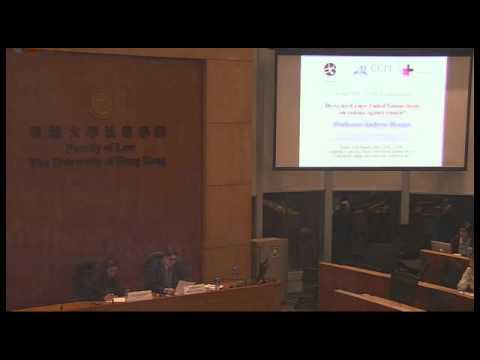Date: 15Jan 2016
Despite decades of international and national action addressing violence against women, the phenomenon continues to exist around the world in myriad forms, imposing enormous human and social costs on individuals and communities. One recent suggestion for enhancing existing responses has been the proposal to develop a new United Nations treaty that would explicitly and systematically address violence against women. A principal proponent of such an initiative has been Rashida Manjoo, the former UN Special Rapporteur on violence against women. Professor Manjoo argues that there is a ‘normative gap’ in international law that such a treaty would fill, and that a new instrument could contribute significantly to the struggle to eliminate violence against women through its symbolic, political and practical impacts. The nature and contents of such a treaty have yet to be delineated, in particular whether it would be substantive or procedural.
This presentation examines the claim that there is a normative gap in international law relating to violence against women. It argues that such a claim is apt to mislead and is also potentially counter-productive insofar as it may undermine the advances of the last three decades which have established and clarified States’ international legal obligations in relation to violence against women. The critical questions in deciding whether a new treaty should be pursued are not whether one can find a ‘normative gap’, but whether the drafting, adoption and implementation of such a treaty would provide overall advantages in efforts to eliminate violence against women, taking into account any disadvantages that this might involve (such as the diversion of resources, the questioning of the coverage of existing treaties. The attempt to construct a normative gap has distorted this inquiry and the focus of our discussions should be what such an instrument might usefully add to the existing body of law, norms and practice on the subject, substantively and in terms of effective advocacy and implementation.
Andrew Byrnes is Professor of Law and Chair of the Australian Human Rights Centre at the University of New South Wales, Australia. Previously, he was Professor of Law at the Australian National University (2001-2005) and prior to that was Associate Professor of Law and Director of the CCPL at the University of Hong Kong (1989-2001), during which time he was closely involved in the drafting of the Hong Kong Bill of Rights and equal opportunities legislation. His work includes publications on gender and human rights, national human rights institutions, economic and social rights, peoples’ tribunals, and the incorporation of human rights in domestic law. He served as President of the Australian and New Zealand Society of International Law from 2009 to 2013. From November 2012 until September 2014 he was external legal adviser to the Australian Parliamentary Joint Committee on Human Rights.




